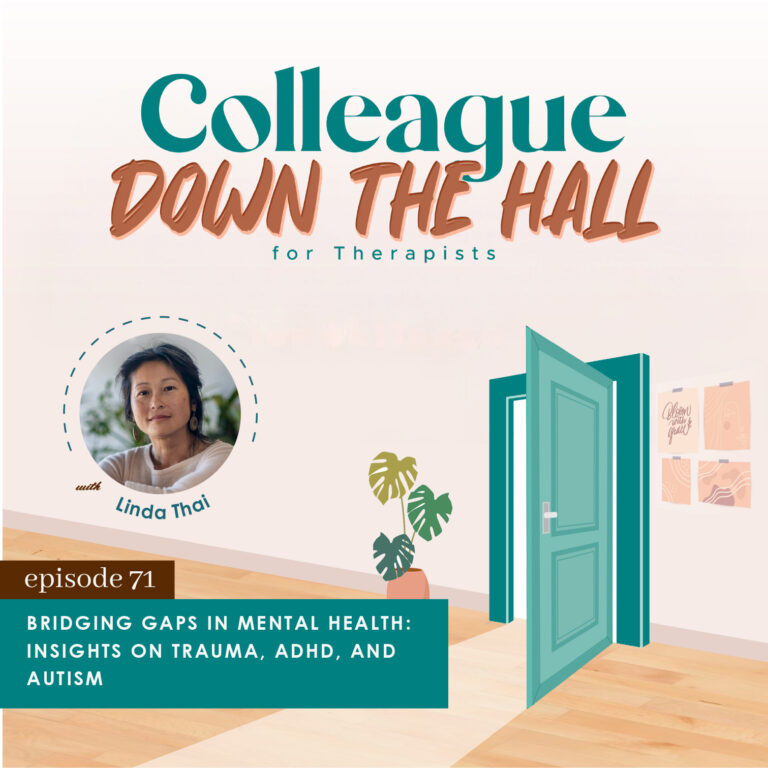CollabOasis Clinical Consultation Groups
New Groups Forming Now!
71. Bridging Gaps in Mental Health: Insights on Trauma, ADHD, and Autism with Linda Thai
71. Bridging Gaps in Mental Health: Insights on Trauma, ADHD, and Autism with Linda Thai

Linda Thai joins me in this new episode of the Colleague Down the Hall podcast to explore how trauma symptoms often overlap with traits of ADHD and autism, stressing the need for accurate differentiation and personalized treatment plans. Our discussion highlights the significance of continuous assessment, a multidisciplinary approach, and the role of peer consultation. We also discuss promoting self-empowerment, reducing stigma, and integrating diverse therapeutic perspectives to enhance client outcomes. Join us as we unravel these complexities and offer insights for effective therapeutic practices.
“Big shout out to Janae Elisabeth of Trauma Geek for their work around distinguishing between autistic traits and autistic trauma, and to bring that information and pull it forward into ADHD traits versus ADHD trauma. It really helps when I do the psychoeducation with clients, so that they can distinguish between the areas that may not change, or actually, we may actually see more of these symptoms. We may see more of these traits emerge as we actually address the trauma, and this doesn’t mean that we’re failing at our treatment plan. It means that as we take away the trauma associated with your need to mask and self protect, that need to mask and self protect actually diminishes. But then how can we support you as your innate neurodivergence begins to emerge, so that it will flourish, so that you can flourish.”- Linda Thai
Takeaways from this episode:
***Overlap of Symptoms: Trauma symptoms can mimic or overlap with traits of ADHD and autism, necessitating careful differentiation.
***Personalized Treatment Plans: Tailoring treatment plans to individual needs is crucial, as each client’s experience of trauma and neurodivergence is unique.
***Continuous Assessment: Ongoing assessment and monitoring are essential to adapt therapeutic strategies and ensure effective treatment.
***Multidisciplinary Approach: Collaboration across various fields and disciplines enhances the understanding and treatment of clients.
***Peer Consultation: Engaging in peer consultation helps therapists gain new perspectives and refine their approaches.
***Self-Empowerment: Empowering clients to take an active role in their therapy fosters resilience and growth.
***Reducing Stigma: Efforts should be made to reduce the stigma around trauma and neurodivergence to create a more supportive therapeutic environment.
***Diverse Therapeutic Perspectives: Integrating various therapeutic approaches and perspectives can lead to more comprehensive and effective treatment outcomes.
About Linda Thai:
Linda Thai, LMSW, ERYT-200, CLYL (she, her) is a trauma therapist who specializes in cutting edge brain- and body-based modalities for the healing of complex developmental trauma.
As an educator and consultant, she is gifted with the capacity to contextualize, synthesize and communicate complex and nuanced issues pertaining to trauma, attachment and the nervous system, including the impact of oppressive systems upon identity, mental health and wellbeing.
Linda is passionate about breaking the cycle of historical and intergenerational trauma at the individual and community levels, and deeply believes in the healing power of coming together in community to grieve.
Born in Vietnam, raised in Australia, and now living in Alaska, Linda is a former child refugee who is not only redefining what it means to be Vietnamese, to be Australian, and to be a United States-ian….she is redefining what it means to be wounded and whole and a healer.
Connect with Linda:
Facebook: https://www.facebook.com/LindaThaiCoachingConsulting/
Website: https://www.linda-thai.com/
